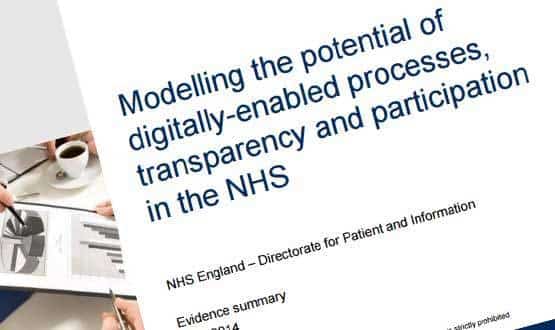A high-level report on NHS IT by management consultants McKinsey makes 22 recommendations to drive the adoption of technology and achieve the anticipated productivity gains; many of which have already become policy.
The report was commissioned by NHS England’s Patients and Information Directorate to inform strategy and underpins its bid to the Treasury’s spending review for up to £5.6 billion national strategic investment in NHS IT.
A PowerPoint presentation of the report, ‘Modelling the potential of digitally-enabled processes, transparency and participation in the NHS’, dated April 2014, has been sent to Digital Health News by Spinwatch, which obtained it under the Freedom of Information Act.
It contends that the funding gap of £30 billion that is projected to open up in NHS finances by 2020-21 could be reduced by 30% with the technological interventions outlined; but that investment totalling £7.3 billion to £8.2 billion will be needed when training, adoption and running costs are taken into account.
Underlining the importance of the report to the development of NHS IT policy over the past eighteen months, some of the 22 recommendations to make sure “the digital agenda is embedded in the NHS” have already become policy, while others look set to do so.
The first is to increase funds available for the next technology fund and strengthen the criteria to include a requirement to demonstrate achievement of efficiency gains as a condition of getting the full award.
NHS England’s director of digital technology, Beverley Bryant, has said that any further technology funding will be linked to an organisation’s local digital road map and digital maturity, measured through a new ‘digital maturity index’ and to unspecified ‘meaningful use’ criteria.
The report says the government should create a tariff strategy to reflect a shift to digital channels, such as a specific tariff for remote outpatient appointments and teleconsulations in care homes.
Another of the report’s recommendations is that the Care Quality Commission should include data quality and the effective use of data within organisations as part of its reviews; and it says there is a need to strengthen information governance rules.
Health secretary Jeremy Hunt announced in September that the CQC will investigate the effectiveness of data security in the NHS.
National data guardian Dame Fiona Caldicott will contribute a new set of protocols against which NHS organisations will be held to account for protection of medical data, by next January.
McKinsey says there should be a review of the standard acute contract to incorporate digital requirements, such as requiring all patient data to be linked to the NHS Number.
Use of the NHS Number as a single patient identifier across health and social care became law last month, however it is not yet included in the standard acute contract; except in regard to discharge letters.
The report also says the GP contract should be changed to include a requirement for the provision of digital services and link this to Quality Outcome Framework rewards to improve uptake.
Changes to the GP contract for 2014-2015 said 95% of GPs had to offer patients online appointment booking, ordering repeat prescriptions and access to a summary of their medical record.
The 22 recommendations also include the accelerated adoption of health apps and risk stratification of the population to target high-risk individuals and families.
Also, to make funding via the £5.3 billion Better Care Fund dependent on the implementation of digital technology such as teleconsultations and data sharing.
The report also outlines four “enabling actions” that could be pursued. One of these is to establish a comprehensive implementation pilot for full digitisation of a single region to prove the benefits of interventions.
However, while a range of integrated care pioneer, vanguard, and Prime Minister’s Challenge Fund pilots have been launched over the past 18 months, there has been no indication from NHS England that this recommendation is going to be adopted.
Read Digital Health editor Jon Hoeksma's view of the report in features.

